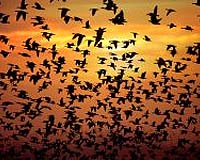| . |  |
. |
St. Louis, Miss. (UPI) Aug 17, 2010 U.S. scientists say they will undertake a project to sequence the genetic content of all the bacteria that live in the human body -- about 900 types. Though it might have a lower profile than the Human Genome Project that preceded it, the Human Microbiome Project, funded by the U.S. government, could have equally important implications, Britain's Daily Telegraph reported Tuesday. The bacteria and microbes that live in and on human bodies play a vastly important role in human health. The gastrointestinal tract alone is home to more than 10 trillion bacteria that make essential amino acids and vitamins, help regulate the immune system and break down starches and proteins. When it comes to understanding how man and bacteria interact, scientists are often at a loss. The Microbiome project will attempt sequencing the genomes -- the genetic content -- of the 900 or so species of microbes that scientists have so far been able to culture in the laboratory. Researchers say they hope to determine whether humans share a core microbial genome, or "microbiome," and identify the ways in which changes in the microbiome correlate with human health and disease. Millions of years of evolution have seen man and microbe come to depend on each other to a remarkable degree, Prof. George Weinstock, a geneticist at Washington University in St Louis, says. "We should no longer think of these organisms in isolation," Weinstock says. "They're more like additional organs of our bodies."
Share This Article With Planet Earth
Related Links Darwin Today At TerraDaily.com
 Increased Destruction Of Bird Populations Are Predicted With Rise In Global Temperatures
Increased Destruction Of Bird Populations Are Predicted With Rise In Global TemperaturesWestminster CO (SPX) Aug 17, 2010 In 2003, a massive heat wave struck and killed some 30,000 people in Europe in an area where heat was not considered a major threat. Similar mass die-offs occur in wild birds and some mammals during heat waves, but unlike humans, birds may not be able to take shelter or find fresh water in order to survive devastating heat. What is the outlook for desert bird communities in light of expect ... read more |
|
| The content herein, unless otherwise known to be public domain, are Copyright 1995-2010 - SpaceDaily. AFP and UPI Wire Stories are copyright Agence France-Presse and United Press International. ESA Portal Reports are copyright European Space Agency. All NASA sourced material is public domain. Additional copyrights may apply in whole or part to other bona fide parties. Advertising does not imply endorsement,agreement or approval of any opinions, statements or information provided by SpaceDaily on any Web page published or hosted by SpaceDaily. Privacy Statement |